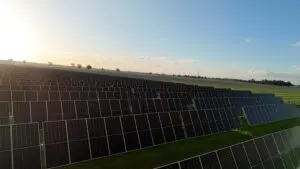Lenz Blog
I think that the 2014 reform of the German renewable energy law was a large step in the wrong direction. I think the auction model favored by that legislation over the feed-in tariff will be a failure.
I am also rather critical of the fact that the European Commission has had undue influence on that legislation, clearly overstepping their powers in a way not compatible with basic democratic values and the German Constitution.
So I noted with interest the failure of the first test case for the auction model. The auction price turned out to be above what the current feed-in tariff is, as this article at PV Magazine explains. Those first 154.97 MW will be built at €0.0917 per kWh, which is higher than the current €0.0902 of the feed-in tariff.
But now comes the fun part. From the article:
Successful bidders now have 24 months to realize their PV projects.
Guess what will happen in those two years with the cost of building solar projects? Might those come down even more?
The correct comparison would be to compare the result of the auction to whatever the market pays for projects finished two years from now, not to compare with projects already finished at today’s cost.
The feed-in tariff actually is an auction model, especially if it is built in a way that reacts to the amount of installations over a certain time period. That’s a point Craig Morris made last year. And the difference in efficiency between the feed-in tariff way of competition and the auction model is even more clear if you note the fact that these auctions were bidding on projects finished two years from now.
In contrast, feed-in tariffs are always paid only for installations already finished. If they could get paid at the rates of two years before their completion, the tariffs would be much higher.
In other news, March was another month of less than 100 MW new solar in Germany. That is about one quarter of what we had only two years ago.
If the goal of the 2014 reform was to keep coal in business longer and make sure that Germany doesn’t meet its climate targets, then congratulations, your strategy is a success.
This article was originally published here http://k.lenz.name/LB/?p=11090#sthash.Abct8gLf.dpuf. Reproduced with permission
Update: Figure changed to re-insert missing decimal point.










